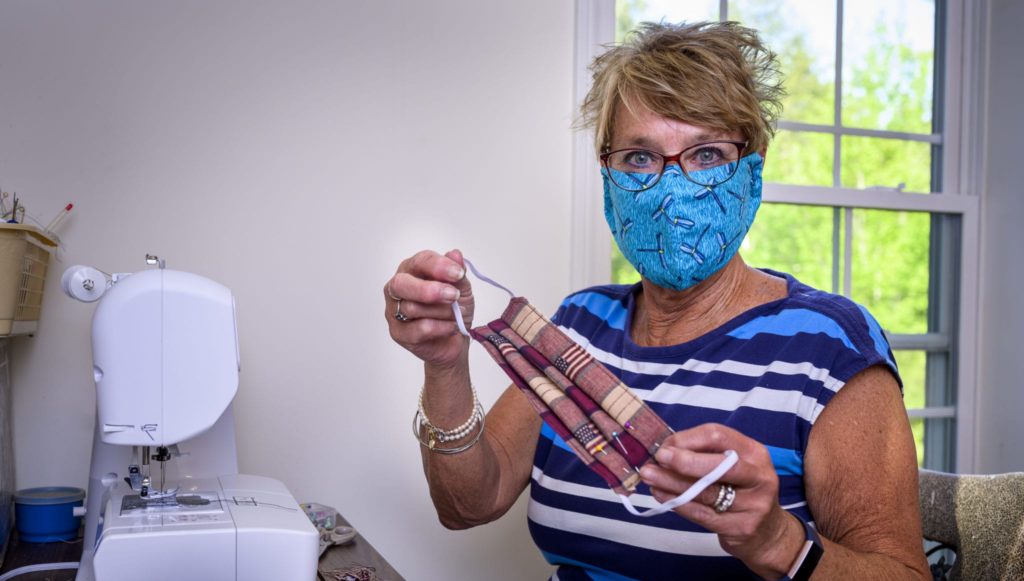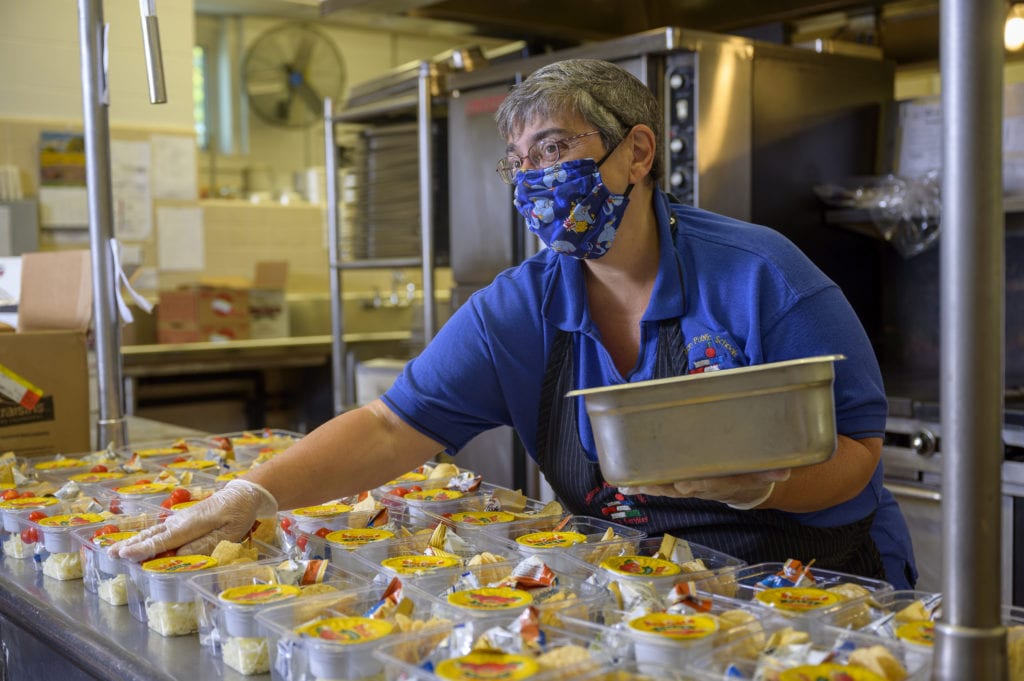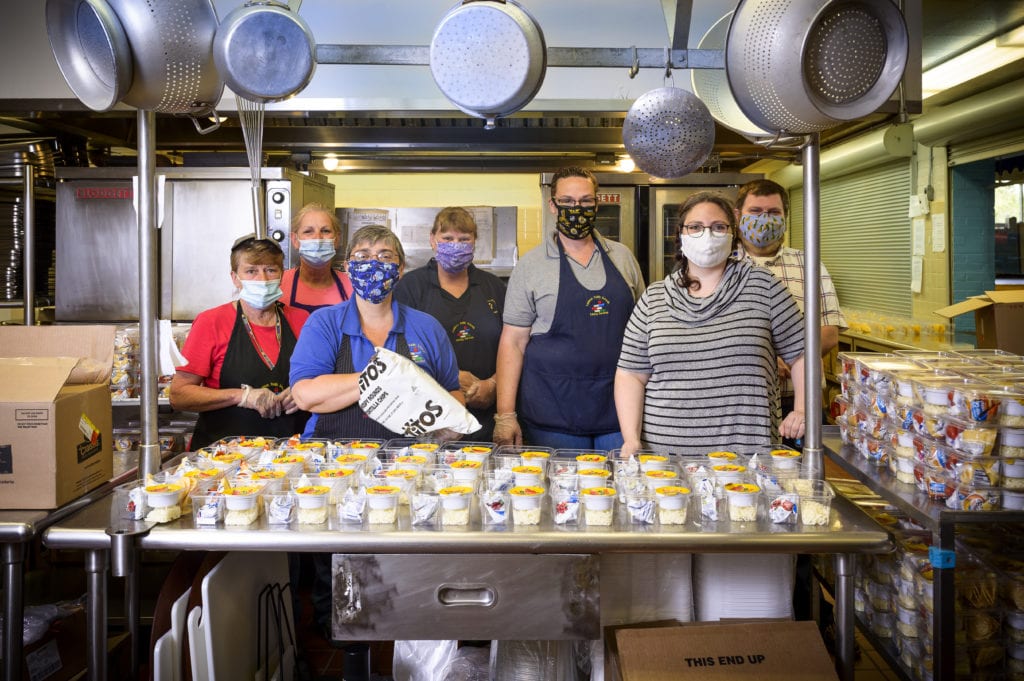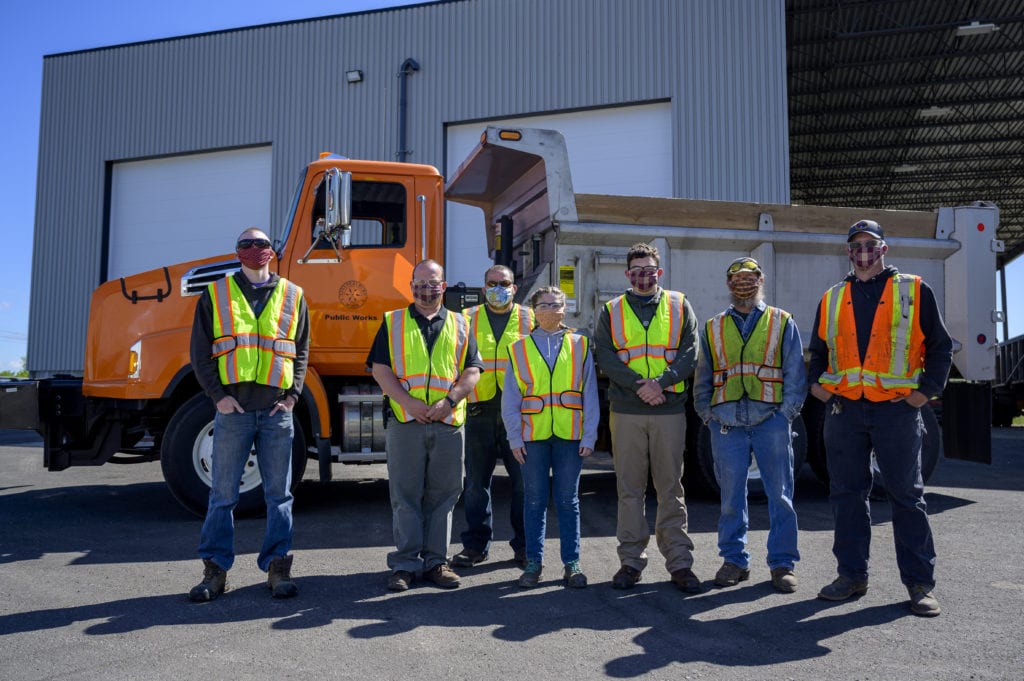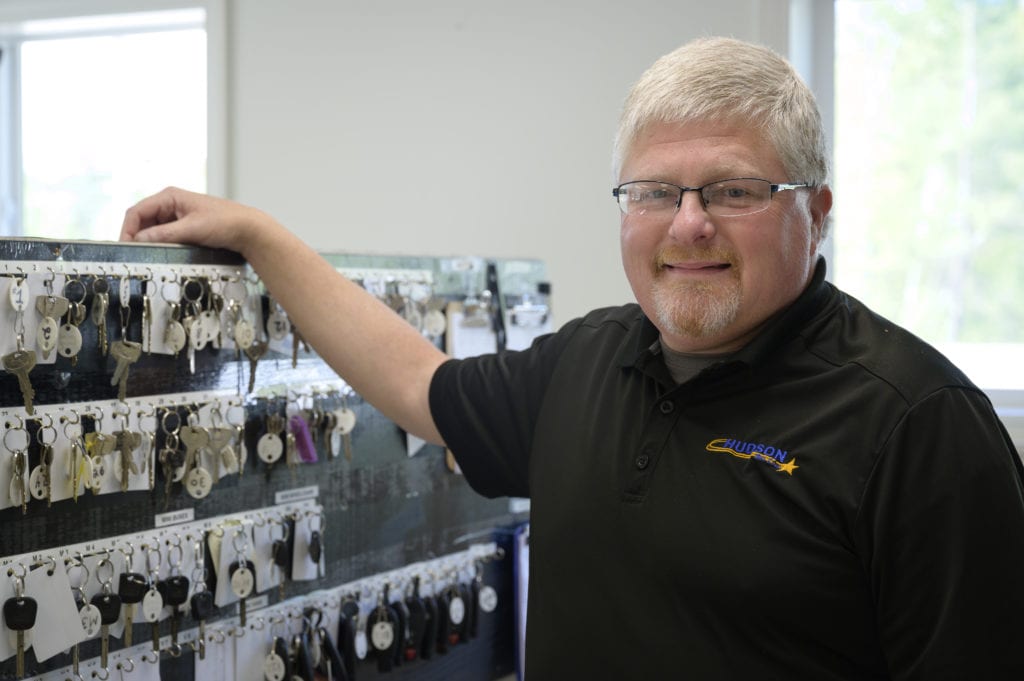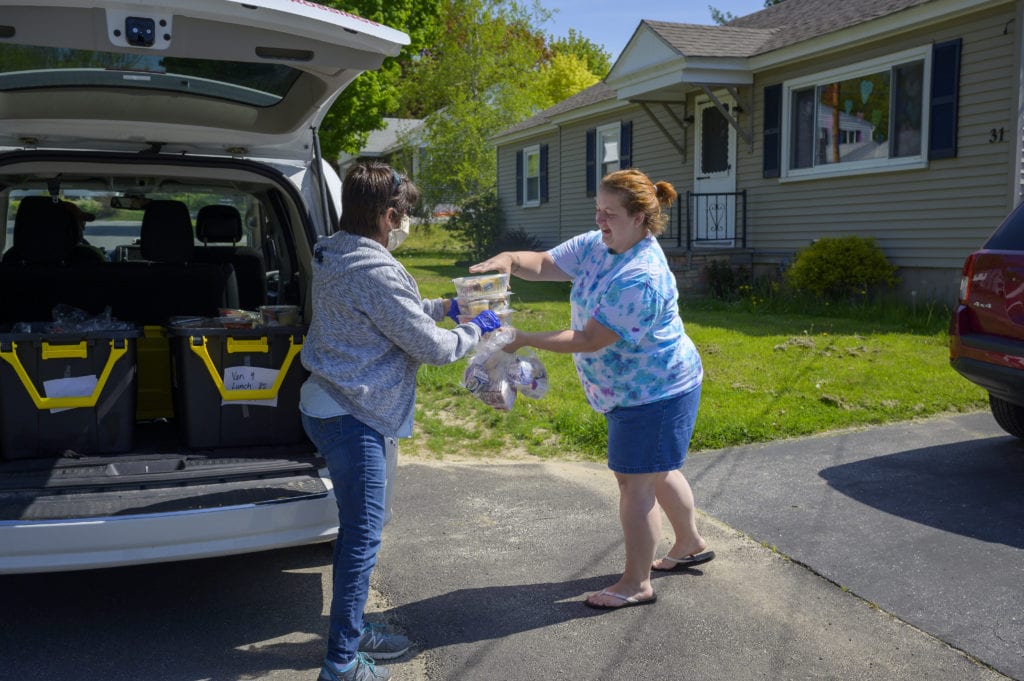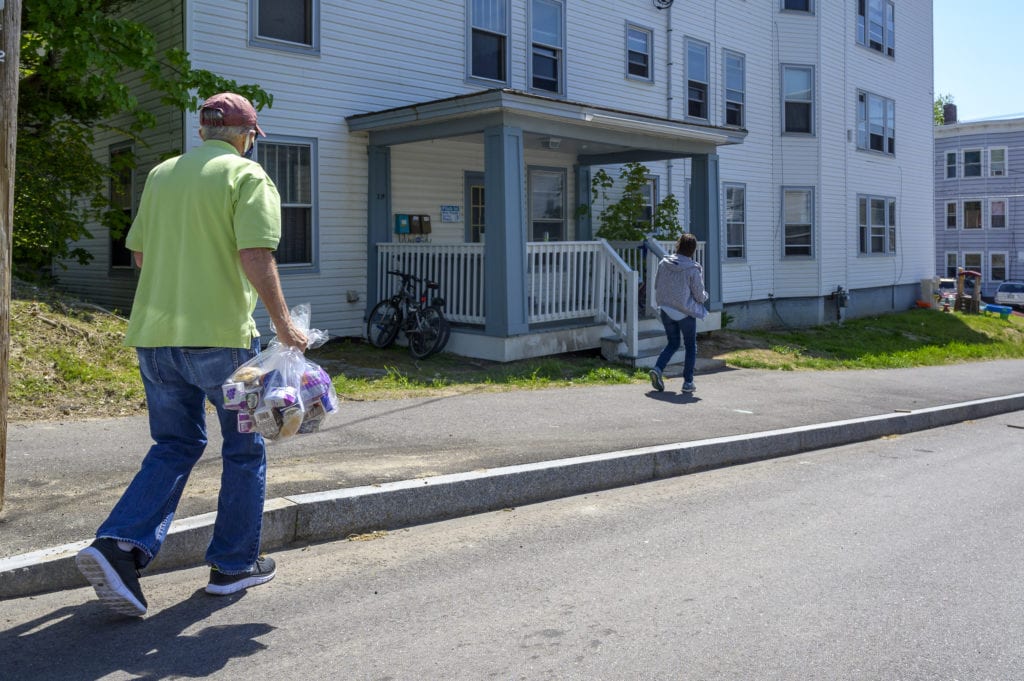By Peggy L. DeBlois | Photography by David Fuller
Despite the heavy weight of living through the recent health pandemic of COVID-19, the Lewiston Auburn community pulled through with acts of good. There are countless examples of people stepping up and making a difference.
LAMM highlights the stories of a manufacturer, a public institution, and an individual who each found a way to pivot from “business as usual” to meeting the needs of our community.
Boston Brands of Maine: From hospitality to hospitals
Throughout the COVID-19 pandemic, alcohol distilleries have been considered essential businesses. Local distillery Boston Brands of Maine made the decision to pivot toward making a product in much-higher demand: hand sanitizer.
Boston Brands of Maine has a long history here in Lewiston, originally as family-owned White Rock Distilleries. The Sazerac Company purchased the facility in 2013 and renamed it Boston Brands of Maine (BBM). The moniker honors its flagship product at the Lewiston facility: Mr. Boston Coffee Brandy.
All of Sazerac’s North American facilities, including Boston Brands of Maine, began hand sanitizer production in late March for some of the world’s largest organizations in the health care, government, military, retail, airline, pharmaceutical, and banking industries.
“There were no products put on hold and no production was stopped,” says Amy Preske, public relations manager at The Sazerac Company. “Actually, demand increased greatly during the time, but our team did a great job continuing to meet customer needs, as well as producing sanitizer to help the community.”
Although nearly 300 employees who work at BBM, the company hired more than 100 additional team members as temporary workers, to supplement the existing workforce. With industry connections to the hard-hit hospitality venues, Boston Brands actively sought to fill positions with displaced restaurant and bar workers.
“We worked with a local ‘temp’ agency to bring them in here to work on our production line, helping bottle not just hand sanitizer, but some of our regular production, too,” says Preske.
While not available for direct purchase, locally-made Sazerac Hand Sanitizer is used by employees of the Maine State Police, United Ambulance Service, and other essential businesses. Employees are excited to help hospitals, homeless shelters, and many more organizations around the United States. According to Preske, BBM donated cases to the Maine Emergency Management Agency, and to Tufts School of Medicine for distribution to the homeless in Maine and Massachusetts.
“Sazerac has always been a company that is nimble and able to react to change quickly,” says Preske. “We’re also a company that holds caring as one of its core cultural values. This experience has shown us that our entire workforce pulls together in times of need, to help others.”
Preske says Sazerac has no plans to turn back from hand sanitizer production in the foreseeable future. “As long as hand sanitizer is needed, we’ll keep making it.”
Lewiston Public Schools: From the cafeteria to the community
The nutrition program at Lewiston Public Schools offers free breakfast, lunch, and two snacks a day to every one of its roughly 5,500 students at its multiple school sites. When the scale and severity of COVID-19 signaled the inevitable school closures, the nutrition program had to find a way to distribute food to these children at home.
When the need for school closures was becoming apparent, Alisa Roman, director of nutrition and transportation for Lewiston Public Schools (LPS) was actually in Washington, D.C., at the School Nutrition Association annual conference. While there, she began scheming how she could use school buses to distribute food, a unique benefit of having one person manage two critical components in the system. Three days later, she was back in Maine, and that worst-case scenario of long-term school closures became a reality.
“Based on census data for each bus stop, I knew where I could bring food via buses,” explains Roman. “I still had to work through how to keep my staff safe and find volunteers to hand out the food.” Roman credits the Lewiston Education Association for finding volunteers. She also cites Peter Ouellette, terminal manager of Hudson Bus Lines, and Dawn Rancourt, transportation coordinator at LPS, as instrumental in helping her get the program up and running immediately.
Lewiston’s school system conducts its nutrition program through the summer months when students are at home, so Roman estimated based on those numbers, projecting a need for 60,000 meals in one month. In the first 11 days in March, the program nearly reached its original one-month projection, distributing 56,000 meals. By mid-April, the program had given out 267,000 meals, demonstrating the city’s tremendous need during this health crisis.
Roman stresses that this entire program, now or during a regular school year, comes with no cost to local taxpayers. The $4.2 million program is completely federally funded, as Lewiston qualifies for the Community Eligibility Provision.
“Since there is a high need of identified families with low income in Lewiston, our nutrition program is free to every student, regardless of income,” says Roman. She adds that LPS has the highest participation in the state, with approximately 4,500-5,000 children eating lunch, and about 3,500-4,000 children eating breakfast. At the new Robert V. Connors Elementary School, the nutrition program has 90% participation.
The nutrition program at LPS has 80 staff balanced between seven in-school kitchens. It was imperative to Roman to keep her staff safe by keeping workers isolated, in secured buildings, and masked.
“I have to manage remotely so if someone gets sick, I could close off that kitchen without the entire program going down.” Roman says she has had lots of people offering to help, and managing volunteers while staying on mission to safely feed children is a constant challenge.
Corporate support of the nutrition program during COVID-19 has been crucial. “The manager at the local Walmart distribution center asked what we needed, and we needed crates to store food,” says Roman. Those crates arrived within the hour, along with plastic bags and ice packs. When a walk–in freezer holding $90,000 worth of food from the government was at risk, due to a power outage, Central Maine Power got the freezer back online almost immediately. Before Tyson Foods closed down operations, they sent 2,000 pounds of chicken; the program froze some and passed the rest to the Green Ladle, which is feeding veterans and homeless during this crisis.
The silver lining for Roman is the tremendous growth of her employees. “The staff has become really creative in both the meal preparation and problem-solving,” she notes. They are also taking initiative since Roman has to work from home. “But we do miss eating lunch with the kids.”
Looking ahead, Roman believes it will be a long time before we see students return to lunchrooms; even if schools reopen, new protocols for numbers of children in one space may preclude cafeteria use. The nutrition program team is hard at work devising plans for how to continue to deliver food to children, no matter the circumstances.
Nancy Richard: From finance to face masks
- Nancy Richards
- Denise Caron, packs today’s lunches.
- Mona Lessard, Terry Carver, Denise Caron, Louise Tancrede, Jen Bourgoin, Alisa Roman, Curt Manchester
- L to R: Hunter Billings, Scott Holland, Walter Reynolds, Mackenzie Heathco, Hints Gish, DJ Sjostrom, Shawn Marston wearing Nancy Richards’ masks.
- Peter Oullette, manager at Hudson Bus Lines.
- Volunteer Celeste Chaloux (L) Victoria Martel
- Hudson Van 10 Driver Bob (L) volunteer Celeste Chaloux (R)
It’s not just corporations and institutions making a difference in this health crisis. One great example of how individuals are making a difference is Nancy Richard, a resident of Androscoggin County who has made and donated over 400 face masks.
Richard started by making a few face masks for family, then friends, and soon the quality and whimsy of her face masks put her sewing skills in high demand.
“My sister and a lot of my friends are nurses,” explains Richard. “Initially, I made about 10 for them, then one thing led to another, and more family, friends, and co-workers were asking me for them. It’s something I can do to give back.”
Richard grew up on a farm, where she learned to sew so the family would have clothes. “I’ve been sewing since I was 9 years old; it was survival,” she says. “Now, with this need, I can use my talent. If there’s something that needs to be done, especially cooking or sewing, I jump in.”
To get started, Richard researched face masks online, checked out several tutorials, and chose one that would be best for most people. She recruited her husband as a live mannequin to get the fit right. She decided on making the face masks reversible, since most people would be wearing them constantly. As the requests have grown, she has expanded to making some with filter pockets and some fitted for children, as well.
People request her masks mostly because of the colorful and fun fabrics. “I am a quilter, so I have a ton of fabric,” she says. Richard reached out to other quilting friends to expand her collection of fabrics and tailors the fabrics to the people ordering.
She produces masks in batches, cutting fabric in bulk, then continuing through the five to six steps to completion. Richard was scheduled to retire in March from her long career in banking, but she decided to continue working at Mechanics Savings to offer some continuity through the pandemic. That means she leaves home at 6:30 a.m., gets home at 3:30 p.m., then sews an hour or two at night. On weekends, she rises early and spends six to seven hours working on face masks. She delivers the masks by bagging them in plastic, labeling each with the person’s name, and leaving them in her car at work for people to pick up.
The growth of Richard’s face mask effort is due to word-of-mouth. “I know a lot of people,” she laughs. “I’ve lived here 20 years, being a local banker and an active member in the LA Metropolitan Chamber of Commerce and Auburn-Lewiston Rotary Club.” Another Rotarian, Joanne Preble, has also been inspired to join the face mask production effort. The two women posted photos on Facebook and started getting more calls. They recently received an order for 50 face masks from the City of Auburn and fulfilled the order in one weekend.
Richard does not charge for the face masks. “It never even occurred to me that I should charge money,” says Richard. “Then I received a check from a physician who explained he was good with a surgical knife, but he was useless with a sewing machine. He insisted I keep the money and use it for postage to fill mail requests.” She says any other payments will be donated to the High Street Congregational Church Food Pantry.
Richard says that the most rewarding thing about her face mask project is how appreciative people are to get them. “When I give them out, I put a little note in them saying this is a gift of life,” she explains. “I think we are in an unprecedented time; people are scared and don’t know what to do. I can give someone piece of mind by giving them a gift of life, something they can wear to protect themselves and others.”
Sharing the good
COVID-19 changed our world, but not just in negative ways. As we all find our way through our new normal, there are stories of inspiration everywhere. Look around, reader, and you will undoubtedly see several examples of good.
If you have more local stories to share with us, please keep this story going by sharing on our Facebook page, using the tag #LAMMfindthegood.


